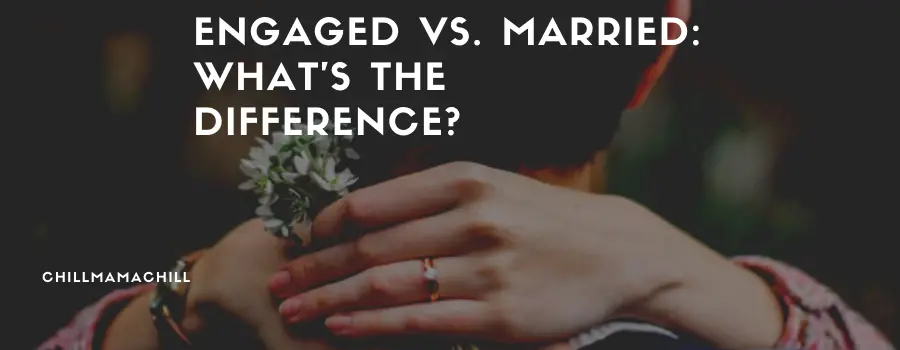So, your partner has asked you to be his fiancé, or it could be you’re the fiancée. Plans are made, and the date is set. But how long should that period last, and what’s the difference between engaged vs. married?
Engagement happens when your boyfriend proposes, preceded by a period of courtship when you were dating. After this, plans for a future wedding day are agreed on, and only after tying the knot in church or a registrar’s office are you legally married. Being engaged isn’t binding, a verbal contract that can be broken when one party changes their mind about marriage.
While rings are exchanged in both instances, engagement is the pre-commit, while marriage is the commitment. It’s not the same, and in some cultures and religions, engaged people shouldn’t live together or even have sexual relations until they get married. To learn more about the difference between these institutions, keep reading.
What’s an Engagement, and Why Is It Different from Being Married?
Ask any dating couple and especially the lady, what the most beautiful question she’d love to hear from her partner is. More often than not, it’s ‘will you marry me?’ That’s called a proposal. It’s a prerequisite to marriage, meaning that you’re now engaged to that person as a promise to wed. But what does it mean, and what’s the difference between an engagement and being married?

A testimony of the desire to get married or a mutual promise for a wedding is called an engagement. Usually, the man, but in some cultures, the woman, asks for the hand of the bride or groom-to-be. The husband or his representatives then negotiate terms of marriage with the bride’s family, and a process of dowry payment can take place before that ultimate ceremony.
Engagement has been practiced for centuries. In ancient Germania, for instance, only after the man paid dowry was the couple considered officially engaged. In some places, such as in India, the reverse happens, and the bride’s family makes these material payments.
Today, engagements are romantic and emotional occasions, especially in western cultures. Rings are often given to the bride-to-be, representing the promise of commitment to and for marriage. That also acts as the official announcement of your intentions to marry. Accepting the proposal or ring seals the deal.
Between Being Engaged vs. Married, Which Occasion Is Publicized and Legal?
None of the two occasions are secret, but the former can occur privately between being engaged and married. Couples often plan an engagement party, or the proposal is made as a surprise, usually in a public place. In 80% of engagements, a couple weds within a year, as proposing signals wedding preparations.
A wedding can take place without the future spouses getting engaged. An engagement is considered complete when the proposal is made and accepted or once you register to get married. In essence, there aren’t other binding conditions, whether moral or legal, for engaging your future spouse. There are also no age requirements for it, and parental consent isn’t necessary either.
In retrospect, the parents, especially the bride, may give their blessings before the couple can be married. That’s considered a sign of customary respect, often sought before the wedding day. In popular culture, the woman takes the man to see her folks soon after he’s popped the proposal question, and she’s agreed to the engagement.
Who Proposes, and How Long Should an Engagement Last?
One variance of engaged vs. married is that the engagement ends once the couple exchanges marriage vows and wedding rings. There are no legal procedures for how long the period lasts, and you’ll find couples engaging for three, four, or even five years. Others marry a few weeks or months of the proposal, with contributing factors like venues for celebrations, planning of the event, or personal opinions.

On average, couples today take longer than they did before the 1960s. It was common practice for engaged spouses-to-be to wait at least 12 months before walking down the aisle. It was also tradition for the man to propose, but women have taken the initiative to pop that question. I’ve heard that a girl can make a marriage proposal on the one day that comes every leap year, 29th February.
In same-sex relationships, where the state allows marriage, it’s often the dominant man or woman who proposes. The ring given after consent to a proposal isn’t a must, but it’s taken as a sign of a favorable agreement to marry. If an engagement breaks down, it’s customary to return this ring to the giver, who is also expected to compensate for any losses incurred when preparing or planning the defunct wedding.
One interesting thing to note is that engaged couples are considered related by law. As such, a fiancé or fiancée isn’t obliged to testify against their future spouse in court.
Can You Announce the Wedding and Not the Engagement?
The two terms engaged vs. married aren’t the same in meaning or function. A marriage has to be publicly announced, whether the ceremony itself is done in private or not. The saying of nuptials must also be presided over by a legal notary, a priest, imam, judge, attorney, or mayor. However, many couples choose to share the news of their engagement with family and friends in an intimate setting.
Many times, the engagement is announced alongside the plans or invites for the wedding. Save-the-date cards have become customary, and in rural areas, you may find local newspapers announcing the engaged couple. The bride’s parents usually organize the celebrations once they’ve given blessings for the marriage to proceed.
It’s a process defined by culture, as in countries like Turkey, or India, engagements are vital ceremonies that lead up to a wedding. Essentially, lavish parties are put on, where both the bride and groom exchange engagement rings.
Conclusion
When a couple is engaged vs. married, it means they’ve made a promise to marry but aren’t actually in a marriage. An engagement precedes a wedding, the formal ceremony where vows and rings are exchanged. Often, engagements are broken, putting off the plans to wed and essentially ending the relationship.

